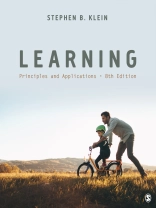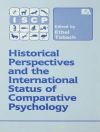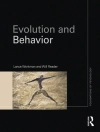Learning: Principles and Applications provides students a current, comprehensive, and engaging introduction to the psychology of learning. Praised for its easy-to-read style and presentation of important contributions of both human and nonhuman animal research, the text helps readers understand the process of learning with coverage of classic experiments, contemporary research, real-world examples, applications, chapter-opening vignettes, and critical thinking questions. The Eighth Edition features expanded sections on theories of conditioning, a streamlined organization through two separate chapters on memory storage and retrieval, and enhanced pedagogy to better connect the material to the everyday lives of students.
Jadual kandungan
Preface
Acknowledgments
About the Author
Chapter 1. An Introduction to Learning
The Gift of Knowledge
A Definition of Learning
Functionalism
Behaviorism
Thorndike
Pavlov
Watson
The Ethics of Conducting Research
Critical Thinking Questions
Key Terms
Chapter 2. The Modification of Instinctive Behavior
If Only This Time
The Instinctive Basis of Behavior
Habituation and Sensitization
Dishabituation
Learning in the Aplysia Californica
Opponent-Process Theory
The Addictive Process
Critical Thinking Questions
Key Terms
Chapter 3. Principles and Applications of Pavlovian Conditioning
A Lingering Fear
Principles of Pavlovian Conditioning
Temporal Relationships Between the Conditioned Stimulus and the Unconditioned Stimulus
Conditions Affecting the Acquisition of a Conditioned Response
Extinction of the Conditioned Response
Other Inhibitory Processes
A Conditioned Response Without Conditioned Stimulus– Unconditioned Stimulus Pairings
Applications of Pavlovian Conditioning
Critical Thinking Questions
Key Terms
Chapter 4. Theories of Pavlovian Conditioning
He Never Saw It Coming
The Nature of the Conditioned Response
Stimulus-Substitution Theory
The Conditioning of an Opponent Response
Sometimes-Opponent-Process Theory
The Nature of the Pavlovian Conditioning Process
Rescorla–Wagner Associative Model
The Unconditioned Stimulus Preexposure Effect
The Potentiation of a Conditioned Response
The Conditioned Stimulus Preexposure Effect
The Cue Deflation Effect
The Importance of Within-Compound Associations
A Comparator Theory of Pavlovian Conditioning
Mackintosh’s Attentional View
The Retrospective Processing View
Critical Thinking Questions
Key Terms
Chapter 5. Principles and Applications of Appetitive Conditioning
A Loss of Control
The Legacy of B. F. Skinner
Instrumental and Operant Conditioning
Types of Reinforcement
Shaping
Schedules of Reinforcement
How Readily Is an Instrumental or Operant Response Learned?
Extinction of an Instrumental or Operant Response
Partial Reinforcement and Resistance to Extinction
Contingency Management
Critical Thinking Questions
Key Terms
Chapter 6. Principles and Applications of Aversive Conditioning
A Good Spanking
Principles of Aversive Conditioning
Escape Conditioning
Vicious Circle Behavior
The Avoidance of Aversive Events
Punishment
Types of Punishment
The Effectiveness of Punishment
The Negative Consequences of Punishment
Applications of Aversive Conditioning
The Ethical Use of Punishment
Critical Thinking Questions
Key Terms
Chapter 7. Theories of Appetitive and Aversive Conditioning
A Lack of Self-Control
The Nature of Reinforcement
Probability-Differential Theory
Application: The Use of Activity Reinforcement
Response Deprivation Theory
Principles of Behavioral Economics
The Pain of Failure
The Nature of Avoidance Learning
The Nature of Punishment
Critical Thinking Questions
Key Terms
Chapter 8. Biological Influences on Learning
A Nauseating Experience
Generality of the Laws of Learning
A Behavior Systems Approach
Animal Misbehavior
Schedule-Induced Behavior
Flavor Aversion Learning
Flavor Preference Learning
Imprinting
The Avoidance of Aversive Events
The Biology of Reinforcement
Critical Thinking Questions
Key Terms
Chapter 9. Traditional Learning Theories
The Oldies But Goodies
Traditional Learning Theories
Hull’s Associative Theory
An Evaluation of Associative Theory
Spence’s Acquired Motive Approach
Guthrie’s Contiguity View
An Evaluation of Contiguity Theory
Tolman’s Purposive Behaviorism
An Evaluation of Purposive Behaviorism
Critical Thinking Questions
Key Terms
Chapter 10. Stimulus Control of Behavior
A Disappointing Review
The Stimulus Generalization Process
Discrimination Learning
Behavioral Contrast
Occasion Setting
Hull–Spence Theory of Discrimination Learning
Errorless Discrimination Training
The Transposition Effect
Sutherland and Mackintosh’s Attentional View
Continuity Versus Noncontinuity
Critical Thinking Questions
Key Terms
Chapter 11. Cognitive Control of Behavior
The Insurmountable Barrier
Tolman’s Purposive Behaviorism
A Mental Representation of Events
The Importance of Habits
Learned Helplessness
Hopelessness Theory of Depression
The Neuroscience of Learned Helplessness
A Cognitive View of Phobic Behavior
Concept Learning
Critical Thinking Questions
Key Terms
Chapter 12. The Storage of Our Experiences
A Fleeting Experience
Measures of Memory
A Three-Stage View of Memory Storage
Sensory Register
Short-Term Store
A Rehearsal Systems Approach
Long-Term Store
The Neuroscience of Memory Storage
Critical Thinking Questions
Key Terms
Chapter 13. Memory Retrieval and Forgetting
A Look Into the Past
Memory Retrieval
How Quickly We Forget
Interference
Reconstruction of the Past
False Memory Syndrome
Motivated Forgetting
The Neuroscience of Memory Retrieval
Application: Mnemonics
Critical Thinking Questions
Key Terms
Glossary
References
Author Index
Subject Index
Mengenai Pengarang
Stephen B. Klein is professor in the psychology department at Mississippi State University. He received a B.S. degree in psychology in 1968 from Virginia Polytechnic Institute and a Ph.D. degree in psychology in 1971 from Rutgers University. Professor Klein taught at Old Dominion University for twelve years and at Fort Hays State University for seven years prior to coming to Mississippi State University in 1990. He also served as head of the psychology department at both Mississippi State University and Fort Hays State University. Professor Klein has written numerous articles for psychological journals in the area of the biological basis of learning and memory and is the author of Motivation: Biosocial Approaches, published by Mc Graw-Hill in 1982; Learning: Principles and Applications, published by Mc Graw-Hill in 1987, 1991, 1996, and 2002; Learning: Principles and Applications published by Sage in 2009, 2012, and 2015, and Biological Psychology, published by Prentice-Hall in 2000. Dr. Klein also coauthored with B. Michael Thorne Biological Psychology, published by Worth in 2007 and coedited with Robert Mowrer the two-volume text Contemporary Learning Theories in 1989 and Handbook of Contemporary Learning Theories in 2001, both published by Lawrence Erlbaum. His family includes his wife, Marie, and five children, Dora, David, Jason, Katherine, and William. In his spare time, he enjoys sports, most passionately baseball, and science fiction, especially Star Trek and Star Wars.












